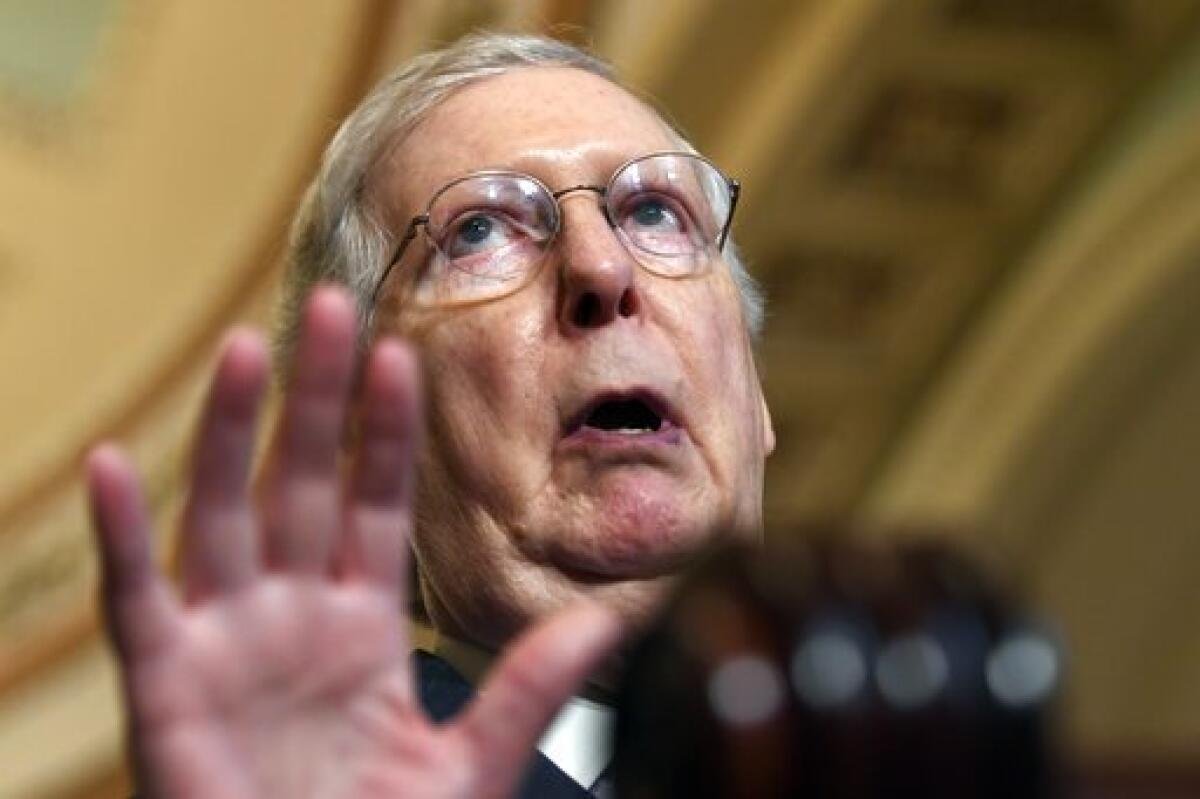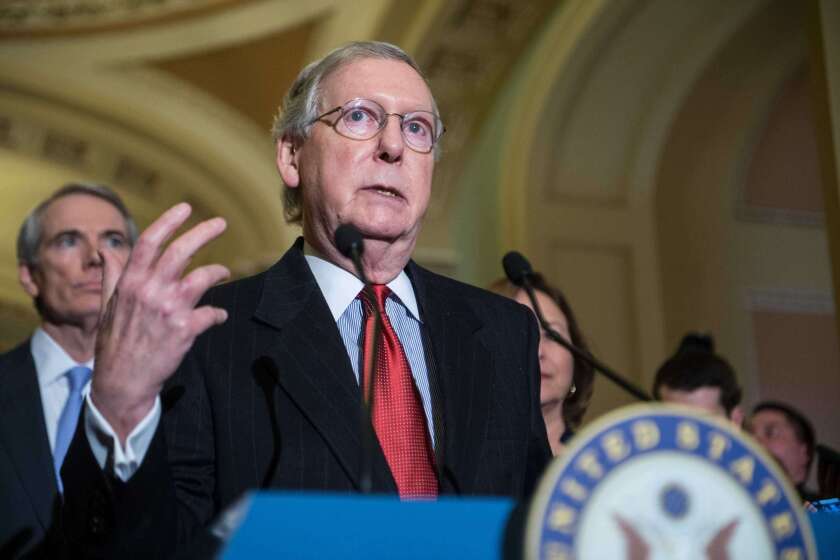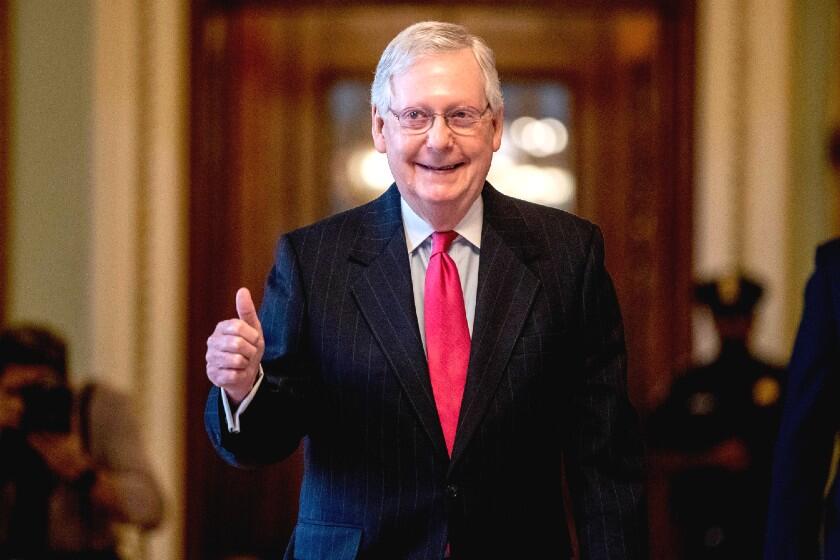Column: Republicans are complaining (again) about the budget deficit

In the time-world of political hypocrisy, you can set your watch by how quickly after the election of a Democrat as president the Republican congressional caucus starts whining about the federal budget deficit.
This phenomenon has surfaced already, a mere month after the election.
“I think spending, entitlement reform, growth and the economy are all things that we’re going to have to be focused on next year, and, yeah, I would expect you’ll hear a lot more about that,” Sen. John Thune (R-S.D.), a member of the GOP Senate leadership team, told the Hill just after Thanksgiving.
Low interest rates mean that countries cannot afford not to undertake fiscal expansions.
— Jason Furman and Lawrence Summers
Thune’s words were reinforced by Sen. Lindsey Graham (R-S.C.), who is expected to become chairman of the Senate Budget Committee if the chamber remains in Republican hands.
“We’ve got to understand that we’re going to be raising the debt ceiling in perpetuity if we don’t find a way to bend the curve,” Graham said.
It should be obvious that “bend the curve” is code for spending cuts, and in the GOP playbook, that means cutting programs that serve the middle class and working class in their times of need, such as Social Security, Medicaid, Medicare, food stamps and other forms of assistance.
The conservative peanut gallery promptly fell into line, too. “Get ready for the Biden spending binge,” the Washington Examiner warned back in July, after Joe Biden won the Democratic nomination for president.
The now-president-elect was “eager to accommodate the demands of the far Left by rolling out a sweeping list of big-ticket proposals,” the Examiner fretted. “And the coronavirus and resulting economic devastation have provided him an excuse for doing so.”
Well, yes.
Make no mistake: Republican hand-wringing about the deficit is entirely driven by partisanship.
Deficit debate driven by the wealthy
As political scientist Daniel Drezner of Tufts University has observed, “It has been a truism in American politics for the past 30 years that: a) when the GOP does not control the executive branch they are very concerned about deficits (see: Contract With America, tea party); and b) that deep distress about deficits magically evaporates once a Republican is elected president (see: Bush 43, Trump).”
Republican deficit panic is based on numerous myths, misconceptions and misrepresentations. Let’s take a look.
One oft-cited metric is the ratio of outstanding government debt to the size of the economy. The underlying notion is that economic growth suffers as the outstanding debt approaches, then exceeds, gross domestic product.
By this standard, the U.S. is in big trouble, since its general government debt now stands at about 107% of GDP (according to the International Monetary Fund).
This is a classic case of comparing apples and oranges, however. GDP is measured as a snapshot in time; debt is paid off over periods of as long as 30 years, and of course can be rolled over at maturity.
In any case, the sharp decline in interest rates should reduce the one relatively legitimate concern about the debt load, which is that debt service will overwhelm the economy. That concern is woefully outdated today.
As economists Jason Furman and Lawrence Summers observed in a recent paper, “at interest rates prevailing in 1992, a country with a 60% debt-to-GDP ratio paid about 5% of GDP in interest.” Today, however, the U.S., with its 107% ratio, will pay only 2% of GDP in interest, with inflation-adjusted interest rates close to zero.
“Low interest rates mean that countries cannot afford not to undertake fiscal expansions,” Furman and Summers write. (Emphasis theirs.)
That’s especially true given the heightened need for public investment. Decades of deficit hawkdom have kept the U.S. from making investments in infrastructure that would have undergirded greater economic growth today and into the future.
On the contrary, deferred maintenance of roads, bridges and other physical structures have produced costs, not savings, for current and future generations, as has skimping on early childhood programs and our educational systems.
The pandemic is destroying state and local budgets, as GOP refuses to help.
As for another traditional rationale for limiting deficit spending — the fear that rising government debt issuance will “crowd out” useful private investment — Furman and Summers argue that that’s also outdated “in a world of unused capacity and very low interest rates and costs of capital.”
The truth is that the size of deficits never matters as much as what government does with the money. Assist ordinary Americans to sustain themselves through a lengthy economic slump caused by a pandemic and to keep states and localities fiscally afloat: Good.
Spend the money on infrastructure including public health investments in testing, vaccines and supplies for healthcare workers: Good.
Funnel hundreds of billions of dollars to corporations that use it to buy up their own shares and to wealthy taxpayers who don’t need a handout: Bad.
Republicans customarily hijack the notion of deficit spending as “investment” to rationalize tax cuts, which they always assert will pay for themselves through faster economic growth. The truth is that they almost never do.
“The value of revenue collection has actually declined in real terms,” the Committee for a Responsible Federal Budget, the leading nest of deficit hawks in Washington, calculated in November 2018, a year after the 2017 tax cuts.
The committee found that although revenue grew in absolute terms, it fell in inflation-adjusted terms. Even in non-inflationary terms, the revenue growth rate was “the eighth-lowest in the past 50 years,” the committee said.
The GOP, however, tends to ignore that investments in social programs and physical infrastructure do pay for themselves. That would be true of such anti-pandemic measures as widespread coronavirus testing and screening, as economists from UCLA and Harvard recently postulated.
Before the economy recovers, GOP wants to stop giving aid
Widespread screening and quick test results “could spur economic recovery by greatly reducing the number of people and businesses sidelined by COVID-19–related fears and unnecessary quarantines, as well as lowering actual sickness and death rates,” they wrote.
Their proposed protocol, which would involve testing “large swaths of the mostly asymptomatic population every 4, 7, 14 or 30 days,” would produce “GDP growth that generates more than enough additional tax revenue to pay for the testing costs.”
Yet the Republican Senate has resisted appropriating money for large-scale screening and testing. The Heroes Act, a coronavirus relief measure passed by the Democratic House in May, would provide $75 billion for testing and contact tracing, among other public health measures.
The $908-billion relief measure expected to secure bipartisan support in the next week or so, however, allocates only $16 billion over 10 years for testing, screening and vaccine development.
Republicans have seldom even tried to conceal the cynicism of their deficit concerns. The year after passing a tax cut that blew a hole of more than $1.5 trillion in the federal budget, Senate Majority Leader Mitch McConnell (R-Ky.) was claiming that “entitlements” — Social Security, Medicare and Medicaid — were “the real drivers of the debt” and had to be adjusted “to the demographics of the future.”
It’s proper, then, to drill down through GOP rhetoric about the sin of higher deficits to unearth the real underlying goals.
They don’t really care about deficits — they just want to raid the treasury to provide more money for their rich patrons, at the expense of ordinary Americans who genuinely need help. Any policymaker, journalist or pundit who fails to see through this charade needs to find another line of work.
More to Read
Inside the business of entertainment
The Wide Shot brings you news, analysis and insights on everything from streaming wars to production — and what it all means for the future.
You may occasionally receive promotional content from the Los Angeles Times.













